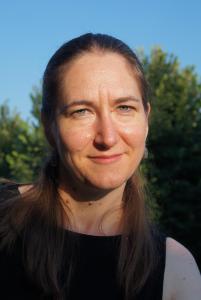
Daniela Vallega-Neu
Research
I earned my PhD at the Albert-Ludwigs-Universität Freiburg (Germany) in 1995 with a work on the notions of grounding and groundlessness in Heidegger and Derrida. Subsequently my research focused on the “bodily dimension in thinking” from a historical-genealogical and phenomenological perspective, exploring works of Plato, Nietzsche, Scheler, Merleau-Ponty, Heidegger, and Foucault. From this project grew my ongoing work on embodied time by focusing on the notion of rhythm. I apporach time in terms of the rhythmic articulation of things and events such that time is of things and events in their encroaching occurrences. At the same time, I continued intensive work on Heidegger’s Contributions to Philosophy (Of the event). I wrote a widely used introduction to this crucial work titled Heidegger’s Contributions to Philosophy: An Introduction (the book was translated into Chinese), and co-translated Heidegger's Contributions to Philosophy (Of the Event) (Indiana University Press, 2011). My latest book is titled Heideggers Poietic Writings: From Contributions to Philosophy to The Event (Indiana University Press, 2018). It traces shifts of themes and concepts in Heidegger’s non-public writings from 1936 to 1941 and also engages these writings critically.
Publications
BOOK PUBLICATIONS
Authored Books
- Heidegger's Poietic Writings: From Contributions to Philosophy to The Event. (Indiana University Press, 2018) [Review: https://ndpr.nd.edu/news/heideggers-poietic-writings-from-contributions-to-philosophy-to-the-event/]
- The Bodily Dimension in Thinking (Plato, Nietzsche, Scheler, Merleau-Ponty, Heidegger, Foucault). (SUNY Press, 2005)
- Heidegger’s ‘Contributions to Philosophy.’ An Introduction. (Indiana University Press, 2003)
- Die Notwendigkeit der Gründung im Zeitalter der Dekonstruktion. Zur Gründung in Heideggers 'Beiträgen zur Philosophie'; unter Hinzuziehung der Derridaschen Dekonstruktion. Berlin: Duncker & Humblot 1997. (“The Need of Grounding in the Age of Deconstruction: On Grounding in Heidegger's 'Contributions to Philosophy’ and its Relation to Derridian Deconstruction.”)
Edited Books
- (Co-editor) A Companion to Heidegger’s ‘Contributions to Philosophy,’ Bloomington: Indiana University Press, 2001.
Translated Books
- Co-translator: Martin Heidegger, Contributions to Philosophy: Of the Event (Indiana University Press, 2011).
- Co-translator: John Sallis, Einbildungskraft by John Sallis (Mohr/Siebeck, 2010).
ARTICLE PUBLICATIONS
- “Heidegger's Reading of Parmenides in the context of Contributions to Philosophy (Of the Event),” in Heidegger and Parmenides, edited by Laurence Hemming and Aaron Turner (forthcoming with Bloomsbury, 2026)
- “On the Body in Heidegger’s Being-Historical Writings,” in Gatherings: The Heidegger Circle Annual, Vol. 15. (Forthcoming 2025)
“Heidegger’s Rethinking of Ontology and Metaphysics,” in Phenomenology, Ontology, Metaphysics, edited by Zach Joachim and Vicente Muñoz-Reja (Leiden: Brill, 2025), Chapter Five, 108-129.
- „Die Zeit des Weltbildes im Kontext von Heidegger’s Seinsgeschichtlichen Schriften,“ in Klassiker auslegen: Heidegger, Holzwege (Berlin: De Gruyter, 2023), 63-77.
- “Among Heretics: Derridean influences in Anglo-American encounters with Heidegger’s later work,” in Heidegger and his Anglo-American Reception: A Comprehensive Approach, edited by John Rogove and Pietro D’Oriano (New York: Springer, 2022), 51-65.
- “Being, Death, and Machination: Thinking Death with and beyond Heidegger,” in Angelaki: Journal of the Theoretical Humanities, Issue 27.1, February 2022: After Life: Recent Philosophy and Death, issue editors Rona Cohen and Ruth Ronen, 93-109.
- “A Strange Proximity: On the Notion of Walten in Derrida and Heidegger,“ in Epoché: A Journal for the History of Philosophy, Vol. 26, Issue 2, Spring 2022, 369-387.
- “John Sallis’ Liminal Phenomenology,” in Philosophy, Art, and the Imagination: Essays on the Work of John Sallis, edited by James Risser (Leiden, Brill, 2021), 173-186.
- “Heidegger at the Limits of Phenomenology,” in (ed.), Fenomenologická ročenka, vol. IX, edited by Aleš Novák (Prag: Togga, 2019), 67-84. ISBN 978-80-7476-167-6.
- “Truth, Errancy, and Bodily Dispositions in Heidegger,” in Heidegger on Affect, edited by Christos Hadjioannou (Palgrave-Macmillan, 2019), 205-226.
- “Body and Time-Space in Heidegger and Merleau-Ponty,” in Research in Phenomenology 49 (2019): 31-48.
- “Truth, Errancy, and Bodily Dispositions in Heidegger,” in Heidegger on Affect, edited by Christos Hadjioannou (Palgrave-Macmillan, 2019), 205-226.
- “Die Schwarzen Hefte und Heideggers seynsgeschichtliche Abhandlungen (1936-1942).” In Heidegger Jahrbuch 11, edited by Alfred Denker and Holger Zaborowski (München: Verlag Karl Alber, 2018), 100-117.
- Attunements, Truth, and Errancy in Heidegger’s Thinking”: in Gatherings7 (2017): 55-69.
- “Thinking Bodily Time-Spaces with and Beyond Heidegger,” in After Heidegger, edited by Gregory Fried and Richard Polt (Roman & Littlefield, 2017), Chapter 28, 295-302.
- “The Dissemination of Time: Durations, Configurations, and Chance.” Research in Phenomenology 47: 1 (2017): 1-18. 18p. DOI: 10.1163/15691640-12341353.
- “The Black Notebooks and Heidegger’s Writings of the Event (1936-1944), in Reading Heidegger’s Black Notebooks 1931-1941 (Cambridge MA: MIT Press, 2016), pp. 127-142.
- “Heidegger’s Reticence: From Contributions to Das Ereignis and Toward Gelassenheit.” Research in Phenomenology, 45.1 (2015): 1-32.
- “Heidegger’s Imageless Saying of the Event.” In Continental Philosophy Review, 2004. DOI 10.1007/s11007-014-9310-4
- “At the Limit of Word and Thought: Reading Heidegger’s Das Ereignis.” In Internationales Jahrbuch für Hermeneutik (Tübingen: Mohr Siebeck, 2013), 77-91.
- “Ereignis” in The Bloomsbury Companion to Heidegger, edited by François Raffoul and Eric Nelson (London: Continuum, 2013), Chapter 35, 283-289.
- “Heidegger’s Poietic Writings.” Chapter 7 of Heidegger and Language, edited by Jeffrey Powell (Bloomington: Indiana University Press, 2013), Chapter 7, 119-145.
- “Bodily Being and Indifference.” Epoché 17:1 (2012): 111-122.
- „Ereignis: Enowning or the Event of Appropriation.“ In Martin Heidegger: Key Concepts, edited by Bret W. Davis (Acumen Publishing, 2010), Chapter 10, 140-154.
- “Rhythmic Delimitations of History: On Heidegger and History.” Idealistic Studies 38/1-2 (2008): 91-103.
- “The Body in Max Scheler’s Phenomenology.” Epoché 9:1 (2004): 19-36.
- “Thinking in Decision. On Heidegger’s Contributions to Philosophy.” Research in Phenomenology, 33 (2003): 247-263 281-283.
- “Poietic Saying.” In A Companion to Heidegger’s ‘Contributions to Philosophy’ (Bloomington: Indiana University Press, 2001), 66-80.
- “La Questione del Corpo nei ‘Beiträge zur Philosophie’.” Giornale di Metafisica - Nuova Serie - XX (1998), 223-238.
Teaching
Fall 2025: Phil104 History of Western Philosophy
Winter 2026: Phil 311 Modern Philosophy
Spring 2026: Phil 463/563 Heidegger (Being and Time)

